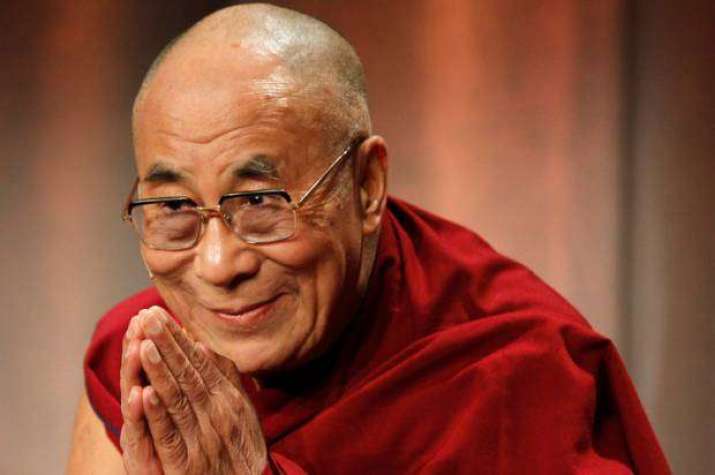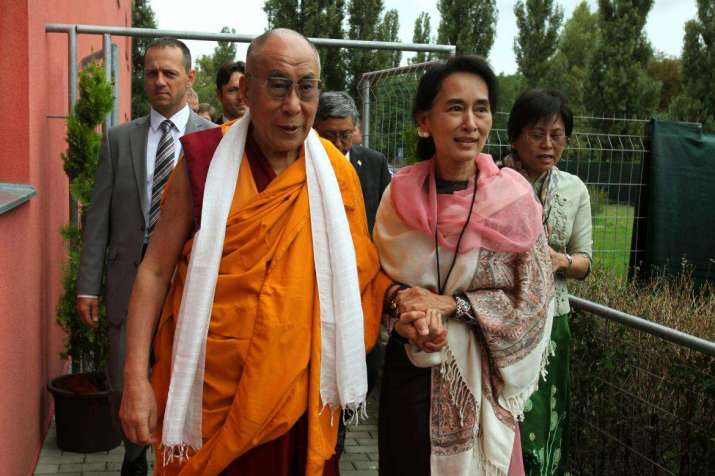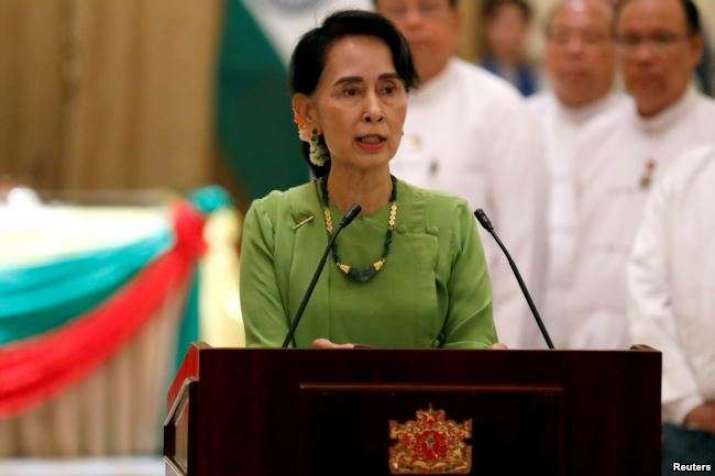NEWS
Dalai Lama Urges Aung San Suu Kyi to Solve Rohingya Crisis in Letter
 His Holiness the 14th Dalai Lama. From salon.com
His Holiness the 14th Dalai Lama. From salon.comHis Holiness the Dalai Lama has expressed his concern over the ongoing violence in Myanmar’s Rakhine State in a letter to fellow Nobel Peace Prize laureate Aung San Suu Kyi that urges the state counsellor of the Southeast Asian nation to find a peaceful solution to the escalating Rohingya crisis.
“May I take the liberty of writing to you once again to tell you how dismayed I am by the distressing circumstances in which the situation seems to have deteriorated further,” the Dalai Lama said in his letter to Suu Kyi. (VOA News)
In the letter, which appears to have been sent two weeks ago, His Holiness refers to previous discussions he had with Myanmar’s de facto leader, in which he urged her to utilize her influence to reduce tensions in the region and to find a peaceful solution for the problems of the Rohingya Muslim minority. “It is disappointing to observe that the problem appears to be getting worse and the violence is increasing,” he wrote. (VOA News)
The Tibetan Buddhist leader cautioned Suu Kyi and members of her government that leaving the crisis unresolved would lead to “further unrest and destruction.” He further wrote: “I appeal to you and your fellow leaders to reach out to all sections of society to try to restore friendly relations throughout the population in a spirit of peace and reconciliation. . . . As a fellow Buddhist and Nobel Laureate, I am appealing to you and your colleagues once more to find a lasting and humane solution to this festering problem.” (VOA News)
 The Dalai Lama and Aung San Suu Kyi prior to a private meeting in Prague in 2013. From frontiermyanmar.net
The Dalai Lama and Aung San Suu Kyi prior to a private meeting in Prague in 2013. From frontiermyanmar.netSpeaking to reporters in northern India on Friday last week, the Dalai Lama observed that the Buddha would “definitely” have acted to help the Rohingya, noting: “Those people who [are] sort of harassing some Muslims, they should remember Buddha in such circumstances. Buddha would definitely [give] help to those poor Muslims, so still I feel that [it’s] so very sad . . . so very sad.” (Asian Correspondent)
The Rohingya are a Muslim minority in Buddhist-majority Myanmar. Myanmar’s government classifies the Rohingya as stateless foreign migrants even though they have lived in Myanmar for generations. Most Rohingya remain in squalid resettlement camps where they are subject to severe restrictions, with limited access to education, healthcare, or employment opportunities. Religious tensions between the Buddhists majority and the Muslims minority, fueled by Buddhist nationalism, a remnant from Myanmar military dictatorship, have simmered for almost half a century, especially in Rakhine State where Rohingya Muslims make up the majority in the north and Buddhists represent the majority in the south.
The tensions in the region led to the latest outbreak of violence on 25 August, when a group of Muslim insurgents—known as the Arakan Rohingya Salvation Army—attacked police posts in Rakhine. According to media reports, almost 300,000 Rohingya Muslims have fled the subsequent violent clashes between insurgents and military forces in Rakhine, which are estimated to have killed more than a 1,000 people, mostly Rohingya. Refugees have reported deliberate attacks against civilians, including children.
Last Saturday, the insurgents called for a temporary ceasefire to address the unfolding “humanitarian crisis,” stating they would pause all offensive operations until 9 October to allow aid groups into the region. The statement called on the government to do the same, but the authorities have rejected the proposal. “We have no policy to negotiate with terrorists,” Zaw Htay, spokesman for the office of State Counsellor Suu Kyi, told the media. (CNN)
On Monday, Zeid Ra’ad al-Hussein, the United Nations high commissioner for human rights, condemned the violence in Rakhine, observing that the situation is difficult to asses since Myanmar has barred human rights investigators from visiting the state, but the situation resembles “a textbook example of ethnic cleansing.” (VOA News)
 Aung San Suu Kyi during a news conference in Myanmar on 6 September 2017. From voanews.com
Aung San Suu Kyi during a news conference in Myanmar on 6 September 2017. From voanews.comThe Dalai Lama is not the only Nobel Laureate to have written to Suu Kyi. South African social rights acivist and retired bishop Desmond Tutu, the youngest Nobel Peace Laureate Malala Yousafzai, and Iranian rights activist Shirin Ebadi, have also appealed to Suu Kyi to resolve the violence.
“I am . . . breaking my vow of silence on public affairs out of profound sadness about the plight of the Muslim minority in your country, the Rohingya,” Tutu wrote in an open letter to Suu Kyi, asking her for a resolution of the violence. He mentioned that he kept a photo of Suu Kyi in his desk to remind himself of the sacrifices she had to make as a result of her “love and commitment” for her people. “If the political price of your ascension to the highest office in Myanmar is your silence, the price is surely too steep,” he wrote. (Asian Correspondent)
Commentators have also called upon the Nobel Prize Commission to revoke Suu Kyi’s Peace Prize, which she received in 1991 for her efforts to promote democracy in military-ruled Myanmar. Since her election to power, Suu Kyi has remained largely silent on situation of the Rohingya minority, which political experts have pointed out is in part due to Myanmar’s fragile new democracy and the still-pervasive influence of the xenophobic military, which constricts Suu Kyi’s sphere of influence.
In his own letter, His Holiness the Dalai Lama, advises Suu Kyi that making efforts to find a peaceful solution will not only be the correct way for the nation to move beyond conflict and hate, but would allow Myanmar to “earn the world's goodwill and respect.” (VOA News)
See more
Dalai Lama Urges Aung San Suu Kyi to Resolve Rohingya Crisis (VOA News)
Dalai Lama urges Suu Kyi to find ‘peaceful solution’ to Rohingya crisis (Phayul.com)
Rohingya crisis: Dalai Lama says Buddha would have helped Muslims (Asian Correspondent)
Dalai Lama: Buddha would have helped Burma's Rohingya Muslims (The Independent)
Myanmar rejects Rohingya offer of temporary ceasefire (CNN)
Buddha would have helped persecuted Rohingya refugees, Dalai Lama says (CNN)
Related news from Buddhistdoor Global
Thousands Flee as Violence Flares in Myanmar’s Rakhine State
Indonesia Bans Myanmar Protests at Borobudur Buddhist Temple
Ultranationalist Buddhist Group in Myanmar Opts for Name Change in Bid to Circumvent Nationwide Ban
Myanmar Picks Former UN Chief Kofi Annan to Head Buddhist-Muslim Rakhine Commission
Myanmar to Form Buddhist-Muslim Commission to Address Humanitarian Crisis in Rakhine State
Aung San Suu Kyi to Lead Peace Effort in Rakhine Against Backdrop of Political Complications
Top Buddhist Authority in Myanmar Begins Moving Against Extremist Buddhist Organizations
Lone Buddhist Reaches Out to Rohingya Children in Myanmar
Aung San Suu Kyi Urges Tolerance and Unity in Myanmar’s Troubled Rakhine State
Related features from Buddhistdoor Global
Buddhistdoor View: Reconciling Nationalism and Buddhism
Change from Within: Creating a World of Hope, Love, Compassion, Empathy, and Forgiveness














